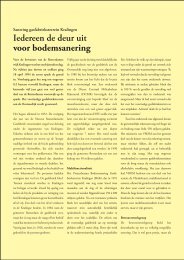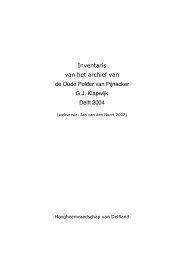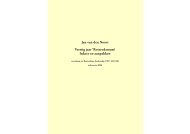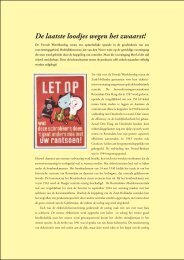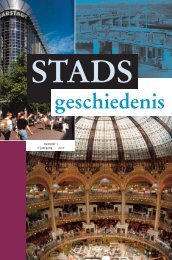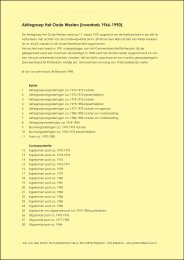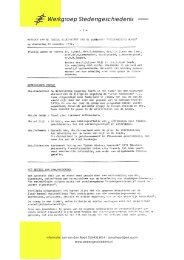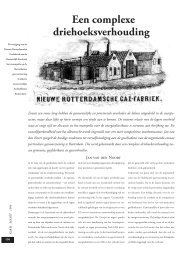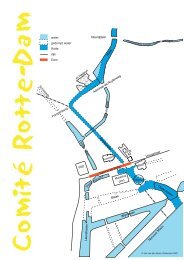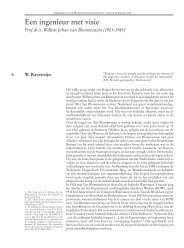Net Werk voor de Geschiedenis van Hygiene en Milieu, 1999-2001 ...
Net Werk voor de Geschiedenis van Hygiene en Milieu, 1999-2001 ...
Net Werk voor de Geschiedenis van Hygiene en Milieu, 1999-2001 ...
You also want an ePaper? Increase the reach of your titles
YUMPU automatically turns print PDFs into web optimized ePapers that Google loves.
22<br />
23<br />
Congress of The International<br />
Union of the Anthropological<br />
and Ethnological Sci<strong>en</strong>ces<br />
(IUAES)<br />
Exploitation and Overexploitation<br />
in Societies Past and Pres<strong>en</strong>t<br />
Götting<strong>en</strong> July 18-21 <strong>2001</strong><br />
Aims of the Congress<br />
“Exploitation and Overexploitation<br />
in Societies Past and Pres<strong>en</strong>t” is the<br />
theme of the <strong>2001</strong> InterCongress of<br />
the lnternational Union of Anthropological<br />
and Ethnological Sci<strong>en</strong>ces.The<br />
question has be<strong>en</strong> chos<strong>en</strong> as<br />
it covers a subject int<strong>en</strong>sely discussed<br />
in the sci<strong>en</strong>tific communities<br />
of anthropology, ethnology, <strong>en</strong>vironm<strong>en</strong>tal<br />
history and related fields<br />
such as archeology or historical<br />
geography. Questions of resource<br />
economics and the evaluation of<br />
human impact on natural systems<br />
gain more and more importance<br />
in public discourse.The Congress<br />
aims to bring together researchers<br />
of related, but oft<strong>en</strong> too distant,<br />
fields and offers insights to the<br />
public as well. Human impact on<br />
landscape can be conceptualised in<br />
terms of socially governed ecological<br />
systems. In the past the adaptive<br />
capacity of human cultural systems<br />
has be<strong>en</strong> emphasised. Nowadays, a<br />
shift can be recognised towards modified<br />
views. Resources are discussed<br />
as prerequisites for establishing<br />
complex human societies.This<br />
inclu<strong>de</strong>s also a more biologically<br />
min<strong>de</strong>d view from the standpoint<br />
of the humanities. In such a view,<br />
human societal complexes can be<br />
un<strong>de</strong>rstood as systems that manage<br />
<strong>en</strong>ergy and matters.The concept of<br />
social-metabolic regimes has <strong>de</strong>veloped<br />
in such a context. Cultures, as<br />
se<strong>en</strong> within this paradigm, are not<br />
un<strong>de</strong>rstood merely as autopoietic<br />
symbolic <strong>en</strong>tities but as results of an<br />
interaction of material prerequisites<br />
and emerging social structures. One<br />
might dismiss this as an epistemological<br />
shift, part of the play of<br />
sci<strong>en</strong>ce with itself. But it remains<br />
unsolved so far in terms of evolutionary<br />
theory if the ultimate goal<br />
of evolution is reproductive success<br />
or accessibility to and optimising of<br />
<strong>en</strong>ergy resources.<br />
There are other important reasons<br />
for this confer<strong>en</strong>ce, however. It<br />
becomes increasingly evi<strong>de</strong>nt that<br />
man-nature-relationships which are<br />
strongly expressed in exploitation<br />
strategies will turn into the most<br />
<strong>de</strong>cisive issue for the forthcoming<br />
c<strong>en</strong>tury.The confer<strong>en</strong>ce will focus<br />
on the most urg<strong>en</strong>t questions of<br />
this <strong>de</strong>velopm<strong>en</strong>t and therefore add<br />
a much-nee<strong>de</strong>d perspective to the<br />
discourse on Global Change.We<br />
aim to refurnish the changing world<br />
with social subjects, their reasoning,<br />
their suffering and their culturally<br />
and biologically driv<strong>en</strong> ability for<br />
solving the chall<strong>en</strong>ge of survival.<br />
68<br />
contactblad <strong>van</strong> <strong>de</strong><br />
stichting net werk <strong>voor</strong> <strong>de</strong><br />
1082-1083<br />
geschie<strong>de</strong>nis <strong>van</strong> hygiëne <strong>en</strong> milieu<br />
redactie: myriam d a r u<br />
webversie: jan <strong>van</strong> <strong>de</strong>n n o o r t<br />
23<br />
24<br />
Preliminary programme<br />
Wednesday July 18th Afternoon<br />
Op<strong>en</strong>ing session<br />
Official addresses<br />
Keynote Addresses Marian Fischer-<br />
Kowalski (Vi<strong>en</strong>na, Austria)<br />
Keynote Addresses Anrew Goudie<br />
(Oxford, UK)<br />
Wednesday July 18th Ev<strong>en</strong>ing<br />
Public Lecture H.J. Schnellnhuber<br />
(Potsdam, Germany)<br />
Reception Aula of the Georg-August<br />
University Götting<strong>en</strong><br />
Thursday July 19th Morning<br />
Pl<strong>en</strong>ary session on Environm<strong>en</strong>tal<br />
History<br />
Speaker Karl Butzer (Austin, Texas,<br />
USA)<br />
Speaker John McNeill (Washington<br />
DC, USA)<br />
Speaker Ver<strong>en</strong>a winiwarter (Vi<strong>en</strong>na,<br />
Austria)<br />
Thursday July 19th Afternoon<br />
Parallel sessions on the topics<br />
Environm<strong>en</strong>tal History (chair<br />
Ver<strong>en</strong>a Winiwarter, Vi<strong>en</strong>na, Austria)<br />
Archaeology of Landscapes (chair<br />
Karl Butzer, Austin, Texas, USA)<br />
Recycling (chair Bernhard Streck<br />
(Leipzig, Germany)<br />
Confer<strong>en</strong>ce Dinner<br />
Friday July 20th Morning<br />
Pl<strong>en</strong>ary session on Sustainability<br />
Speaker William Woods (Edwardsville,<br />
USA)<br />
Speaker Rolf Peter Sieferle (St Gall<strong>en</strong>,<br />
Switzerland)<br />
Speaker Joan Martinez-Alier (Barcelona,<br />
Spain)<br />
Friday July 20th Afternoon<br />
Parallel sessions on the topics<br />
Concepts of Sustainability (chair<br />
Rolf Peter Sieferle, St. Gall<strong>en</strong>, Switzerland)<br />
Agricultural Systems vs. Industrialized<br />
Systems (chair Andrew Goudie)<br />
Human Subsist<strong>en</strong>ce in Past and Pres<strong>en</strong>t<br />
Societies (chair Rainer Marggraf)<br />
Saturday July 21st Morning<br />
Pl<strong>en</strong>ary session on Environm<strong>en</strong>tal<br />
Sociology<br />
Speaker Gerd Spittler (Bayreuth,<br />
Germany)<br />
Speaker Bernhard Streck (Leipzig,<br />
Germany)<br />
Saturday July 21st Afternoon<br />
Parallel sessions on the topics<br />
Nature in Culture-Culture in Nature<br />
(chair Bernd Hermann, Götting<strong>en</strong>,<br />
Germany)<br />
Extreme Environm<strong>en</strong>tal Conditions<br />
(chair Tim Ingold, Aber<strong>de</strong><strong>en</strong>, UK)<br />
Evaluating Summary by Roy Ell<strong>en</strong><br />
(Canterbury, UK)<br />
Closing lecture<br />
Sunday July 22nd Morning<br />
Post Congress Excursion to the<br />
Ethnographic Museum Berlin<br />
24<br />
25<br />
22/23 <strong>Net</strong> <strong>Werk</strong> 68 - februari <strong>2001</strong><br />
23/25



